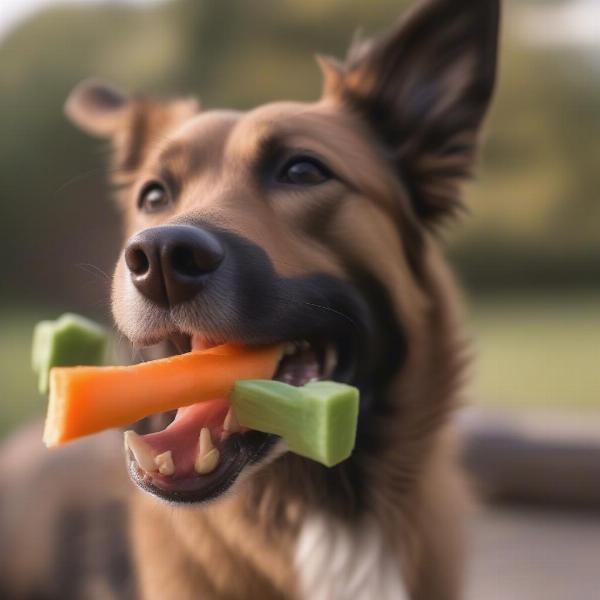Mike’s Hot Dog, while a tempting name, isn’t about feeding your canine companion processed meat. This article clarifies the confusion and focuses on providing safe and healthy treat options for your furry friend. We’ll explore the dangers of processed foods like hot dogs for dogs, delve into the importance of a balanced diet, and offer delicious, nutritious alternatives you can feel good about giving.
 Dog enjoying healthy treats
Dog enjoying healthy treats
Understanding the Risks of Processed Foods for Dogs
Many human foods, including hot dogs, are unsafe for dogs. Processed meats like hot dogs contain high levels of sodium, fat, and preservatives, all of which can contribute to various health problems in dogs, from obesity and pancreatitis to heart disease and even certain types of cancer. Onions and garlic, common ingredients in hot dog seasonings, are also toxic to dogs. While a small bite might not cause immediate harm, repeated exposure can have cumulative negative effects.
Nourishing Your Canine Companion: A Balanced Diet is Key
Just like humans, dogs thrive on a balanced diet that provides all the essential nutrients they need for optimal health and well-being. This includes high-quality dog food formulated for their specific age, breed, and activity level, supplemented with healthy treats in moderation.
Choosing the Right Treats for Your Dog
When choosing treats, opt for natural, wholesome options that are low in calories, fat, and sodium. Excellent choices include fresh fruits and vegetables like apple slices (remove the core and seeds), carrot sticks, and green beans.
“Always introduce new foods gradually to monitor for any allergies or digestive upset,” advises Dr. Emily Carter, DVM, a veterinary nutritionist with over 15 years of experience. “And remember, treats should make up no more than 10% of your dog’s daily caloric intake.”
Delicious and Nutritious Treat Alternatives
Instead of “Mike’s Hot Dog,” consider these healthy and appealing alternatives:
- Homemade dog treats: Control the ingredients and tailor the recipe to your dog’s specific needs. There are numerous easy recipes available online using ingredients like peanut butter (xylitol-free), oats, and bananas.
- Commercially available healthy treats: Look for single-ingredient treats made from dehydrated meat, fish, or sweet potato. Check the ingredient list carefully and avoid products with artificial colors, flavors, or preservatives.
- Frozen treats for summer: Blend plain yogurt with dog-safe fruits like blueberries or bananas for a refreshing and hydrating treat on a hot day.
Prioritizing Your Dog’s Health
Ultimately, prioritizing your dog’s health means making informed choices about their diet and avoiding potentially harmful foods like hot dogs. By focusing on a balanced diet and offering healthy, nutritious treats, you can ensure your furry friend lives a long, happy, and healthy life.
Conclusion
While the allure of “Mike’s Hot Dog” might be strong, it’s crucial to prioritize your dog’s health by choosing safe and nutritious treats. By understanding the risks of processed foods and embracing a balanced diet, you can provide your canine companion with the best possible care. Remember to consult with your veterinarian for personalized dietary recommendations.
FAQ
- Can dogs eat hot dogs? No, hot dogs are not recommended for dogs due to their high sodium, fat, and preservative content.
- What are some healthy treat alternatives for dogs? Healthy alternatives include fresh fruits and vegetables, homemade dog treats, and commercially available single-ingredient treats.
- How many treats should I give my dog per day? Treats should not exceed 10% of your dog’s daily caloric intake.
- What should I do if my dog accidentally eats a hot dog? Monitor your dog for any signs of gastrointestinal upset and contact your veterinarian if necessary.
- Are there any human foods that are toxic to dogs? Yes, several human foods are toxic to dogs, including onions, garlic, chocolate, grapes, and raisins.
- What are the signs of a food allergy in dogs? Signs of a food allergy can include itching, skin rashes, vomiting, and diarrhea.
- How can I ensure my dog is getting a balanced diet? Feed your dog a high-quality dog food formulated for their specific needs and supplement with healthy treats in moderation.
You Might Also Be Interested In:
About ILM Dog: ILM Dog is your trusted resource for comprehensive information on dog care and nutrition. We offer expert advice on everything from breed selection and puppy care to senior dog health and training. With a focus on providing practical tips and evidence-based information, we empower dog owners worldwide to make informed decisions about their furry companions. Contact us at [email protected] or +44 20-3965-8624 for personalized guidance on dog nutrition and discover a world of healthy treat options for your beloved pet.